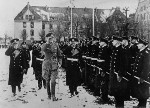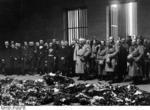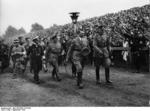Erich Raeder
| Surname | Raeder |
| Given Name | Erich |
| Born | 24 Apr 1876 |
| Died | 6 Nov 1960 |
| Country | Germany |
| Category | Military-Sea |
| Gender | Male |
Contributor: C. Peter Chen
ww2dbaseErich Johann Albert Raeder was born into a middle-class family in Wandsbek, Hamburg, Germany. He joined the Imperial German Navy in 1894. By 1912 he was already the Chief of Staff for Franz von Hipper. During WW1, he participated in the Battle of Dogger Bank in 1915 and the Battle of Jutland in 1916. He joined the admiral rank in 1922 with a promotion to rear admiral. He was promoted vice admiral in 1925 and full admiral in 1928. Although he disliked the Nazi philosophy, he supported Adolf Hitler's rise for the opportunity to strengthen the navy. On 20 Apr 1936, Hitler presented him with the rank of general admiral; he was later awarded the rank of grand admiral in 1939.
ww2dbaseWhen the military phase of WW2 broke out in Europe, Raeder was instrumental in Germany's interest in Denmark and Norway, which gained the Kriegsmarine valuable ports on the long Norwegian coast. Understanding that his navy cannot compete with its British counterparts, he voiced against a German invasion of Britain, but the planning for Operation Sealion continued nevertheless. That plan was later postponed indefinitely after Göring's inability to win the Battle of Britain. Raeder also voiced his recommendation against an invasion of Russia, but as the Russian invasion largely involved land forces, he had even less influence on the decision making process. During 1943, his career became overshadowed by the recent successes of Admiral Karl Dönitz. Raeder finally resigned from his position in May 1943; Dönitz had already taken over Raeder's command position in Jan 1943.
ww2dbaseAfter the war Raeder was sentenced to life imprisonment at the Nuremberg Trials for waging a war of aggression. The sentence was later reduced, and then he was released early on 26 Sep 1955 for health reasons. He wrote an autobiography in 1957 and passed away in Kiel in 1960.
ww2dbaseSource: Wikipedia.
Last Major Revision: Feb 2006
Erich Raeder Interactive Map
Photographs
 |  |  |  |
Erich Raeder Timeline
| 24 Apr 1876 | Erich Raeder was born. |
| 13 Dec 1935 | Representatives of Deutsche Werke Kiel AG in Germany met with Erich Raeder on the construction of a third slip. |
| 23 Oct 1939 | On being told by Admiral Erich Raeder that he lacked adequate support from both the civil administration and the other two military branches, Adolf Hitler sent a memorandum to the Air Force and Army Commanders-in-Chiefs as well as to the Ministers concerned. The memo made it clear that "All measures for attacking the merchant shipping and economic resources of Great Britain were to be directed through the O.K.W. (Oberkommando der Wehrmacht)." This gave Raeder the chance to press for a relaxation of the restrictions on sinking neutral vessels trading with England. Hitler however remained adamant that any incidents should be forbidden until he was ready to strike on land. He told the admiral that he was worried about the name of the heavy cruiser Deutschland. As soon as she arrived back her name was to be changed to Lützow. "Should she be sunk with her present name it would have serious repercussions back home." Hitler then ordered a meeting of Naval Staff in Berlin, Germany on 1 Nov 1939. |
| 1 Nov 1939 | In a meeting with General Wilhelm Keitel and Lieutenant Commander Karl-Jesko von Puttkamer, Adolf Hitler's liaison officer with the Naval War Staff in Berlin, Hitler repeatedly told the officers that the name of the cruiser Deutschland should be changed and the ship was to avoid any action the same orders were to be issued to the Scharnhorst and the Gneisenau. Hitler was worried that any action would bring out the British Grand Fleet before air protection was organised. The Graf Spee, on station in the South Atlantic was to be ordered to be ready to sail to the Indian Ocean. Any operations of battleships must be held until Italy entered the war and the British Forces consequently held down. Submarine warfare was to be intensified. Passenger ships could be attacked and neutral ships would be attacked once a state of siege be declared against Britain. Hitler would not give priority to the production of submarines however, as Army equipment and ammunition supplies were of prime importance. Erich Raeder sent a copy to Admiral Karl Dönitz, Commander of the Submarine Arm with a note saying that in order to carry out a large scale submarine war then continuous pressure would be necessary. |
| 15 Nov 1939 | Anticipating Adolf Hitler's wishes, Erich Raeder asked his staff officers to evaluate the possibility of an invasion of Britain. |
| 8 Dec 1939 | Admiral Erich Raeder requested a meeting with Adolf Hitler as political and military situations were developing quickly in these early days of the war. Great Britain told Germany that they would confiscate all German exports (until then only imports had been treated as contraband). This was because of Germany's act of laying magnetic mines since 18 Nov 1939. Japan, the Netherlands, Belgium, Denmark and Sweden all protested to London about this and Raeder thought it would help him to convince Hitler to sanction his plan for "Siege of England". At the end of the meeting Raeder had got no further with his plans of blockade and realised that the situation would not change until after the invasion of the Low Countries. |
| 12 Dec 1939 | Erich Raeder reported to Adolf Hitler after Raeder had met with Norwegian leaders Vidkun Quisling and Albert Viljam Hagelin. Raeder noted of the Norwegian popular hostility toward Germany, Britain's great influence on the Norwegian government through its high court, and the possibility that Britain might soon occupy Norway. Hitler stated that Britain must never be allowed to occupy Norway. Raeder also recommended Hitler to be neutral in the Winter War, although it was advisable to continue supplying fuel for Soviet submarines. |
| 15 Dec 1939 | Erich Raeder suggested that the pocket battleship Lützow and the blueprints for the Bismarck-class battleships could be made available for sale to the Soviet Union if the Soviet Union was willing to pay a good price. |
| 20 Jun 1940 | Adolf Hitler, jubilant over the victory in France, summoned his military chiefs to the Wolfsschlucht I headquarters in the village of Brûly-de-Pesche, Belgium to discuss the future regarding Britain and the situation that Germany faced. |
| 21 Jun 1940 | Erich Raeder met with Adolf Hitler to discuss the invasion of Britain. |
| 11 Jul 1940 | A meeting between Admiral Erich Raeder and Adolf Hitler took place at the Obersalzberg, Berchtesgaden, Germany where matters of how things were in Norway and Hitler's plans for that area were made clear. How to continue the war against Britain was discussed and again Hitler made it clear of his aims and that no invasion was to take place until all efforts had been made to bring the British government to sue for peace. However, within the next few days Hitler would change his mind. |
| 13 Aug 1940 | Erich Raeder met with Adolf Hitler and attempted to convince Hitler to reduce the landing front for the planned invasion of Britain as the German Navy had little means to maintain the security of a wide landing area. |
| 6 Sep 1940 | Erich Raeder met with Adolf Hitler in regards to the invasion of Britain. |
| 26 Sep 1940 | Erich Raeder met with Adolf Hitler, noting that the Italian territories in the Mediterranean Sea was in danger of being attacked by the British as he deduced from the importance the British had placed on the region historically. To prevent this, he recommended Hitler to make plans to seize Gibraltar, the Canary Islands, and the Suez Canal. |
| 27 Dec 1940 | Erich Raedar met with Adolf Hitler in Berlin, Germany. |
| 4 Feb 1941 | Erich Raeder thought that the US entry into the war might be advantageous for the Germans as it would force Japan into belligerency. |
| 18 Mar 1941 | Adolf Hitler met with Wilhelm Keitel, Alfred Jodl, and Erich Raeder; Raeder urged Hitler to convince Japan to attack Singapore and recommended Hitler to reveal the plans of the Soviet invasion to Japan. |
| 20 Apr 1941 | Erich Raeder attempted to convince Adolf Hitler to allow German submarines to attack American ships; Hitler rejected the request, citing his unwillingness to provoke the Americans to fully enter the war. |
| 22 Apr 1941 | Erich Raeder reported to Adolf Hitler regarding American belligerency despite of neutrality pledges. |
| 22 May 1941 | Erich Raeder responded to Adolf Hitler's inquiry regarding a German occupation of the Azores islands as long range bomber bases (although Germany had no such bombers at that time) as difficult, as the German Navy was not strong enough to guard the islands should they be taken. |
| 30 May 1941 | Erich Raeder recommended Adolf Hitler an attack on the Suez Canal in Egypt. |
| 17 Sep 1941 | At Adolf Hitler's Wolfsschanze headquarters in East Prussia, Germany, Erich Raeder once again asked Hitler for permission to attack American shipping; Hitler again rejected him. |
| 12 Dec 1941 | In a meeting with Adolf Hitler, Erich Raeder noted to Hitler that the Americans would most likely divert warships to the Pacific Ocean which was advantageous for the German Navy. |
| 6 Jan 1943 | In a conference between Adolf Hitler and Erich Raeder, Hitler continued to express his anger in the German Navy's ineffectiveness. Raeder asked to be relieved of his duty. |
| 30 Jan 1943 | Erich Raeder was officially relieved of his duty as the head of the German Navy. |
| 26 Sep 1955 | Erich Raeder was released from Spandau Prison in Berlin, Germany. |
| 6 Nov 1960 | Erich Raeder passed away. |
Did you enjoy this article or find this article helpful? If so, please consider supporting us on Patreon. Even $1 per month will go a long way! Thank you. Share this article with your friends: Stay updated with WW2DB: |
Visitor Submitted Comments
All visitor submitted comments are opinions of those making the submissions and do not reflect views of WW2DB.
» Hossbach Conference
» Start of the Battle of the Atlantic
» Merano Conference
» Nuremberg Trials and Other Trials Against Germany
Document(s):
» Message from Adolf Hitler to Erich Raeder
» Message from Erich Raeder to Adolf Hitler
» Minutes of Meeting Between Adolf Hitler and Erich Raeder
» Minutes of Meeting Between Adolf Hitler, Erich Raeder, and Wilhelm Keitel
» Minutes of Meeting Between Adolf Hitler, Erich Raeder, and Wilhelm Keitel
- » 1,150 biographies
- » 337 events
- » 44,024 timeline entries
- » 1,241 ships
- » 350 aircraft models
- » 207 vehicle models
- » 375 weapon models
- » 123 historical documents
- » 260 facilities
- » 470 book reviews
- » 28,582 photos
- » 432 maps
General Douglas MacArthur at Leyte, 17 Oct 1944
Please consider supporting us on Patreon. Even $1 a month will go a long way. Thank you!
Or, please support us by purchasing some WW2DB merchandise at TeeSpring, Thank you!
1 Sep 2011 08:40:02 AM
They were Greatmen,wonderful and Brave heart..
I wish I was in thier age..